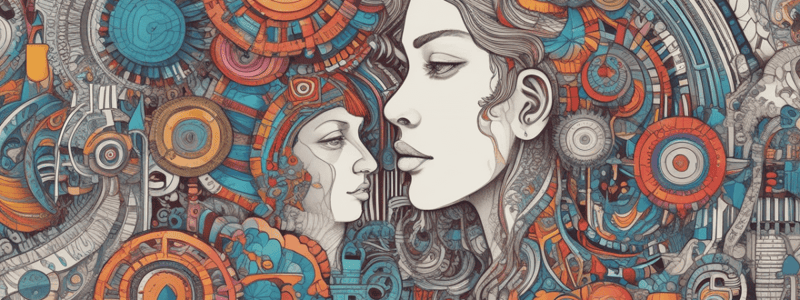Podcast
Questions and Answers
What is one characteristic of intuitive thinking according to the text?
What is one characteristic of intuitive thinking according to the text?
- It involves a deliberate process of retrieving information
- It involves a passive experience in forming judgments (correct)
- It requires following a specific program learned in school
- It requires paying attention to steps and partial products
Which mode of thinking described in the text involves actively going through a learned program to produce an answer?
Which mode of thinking described in the text involves actively going through a learned program to produce an answer?
- Intuitive thinking
- Impression
- Perception
- Non-intuitive thinking (correct)
What is a clear distinction made between intuitive and non-intuitive thinking in the text?
What is a clear distinction made between intuitive and non-intuitive thinking in the text?
- Intuitive thinking involves following steps sequentially, while non-intuitive thinking is spontaneous
- Intuitive thinking requires conscious effort, while non-intuitive thinking is automatic
- Intuitive thinking is slow and deliberate, while non-intuitive thinking is quick and automatic
- Intuitive thinking involves passive experiences, while non-intuitive thinking involves active retrieval of learned programs (correct)
What indicates how non-intuitive thinking works?
What indicates how non-intuitive thinking works?
In the context of the text, what does 'it just happens' refer to?
In the context of the text, what does 'it just happens' refer to?
What operation is required to produce the answer '408' according to the text?
What operation is required to produce the answer '408' according to the text?
Which of the following statements is true regarding the mind's ability to remember information?
Which of the following statements is true regarding the mind's ability to remember information?
What is meant by the phrase 'System 1 does X'?
What is meant by the phrase 'System 1 does X'?
What strategy does the author suggest to better remember the concept of System 1?
What strategy does the author suggest to better remember the concept of System 1?
What does the author imply about the effectiveness of using agents and their traits as a memory aid?
What does the author imply about the effectiveness of using agents and their traits as a memory aid?
Based on the text, which of the following statements is true regarding the mind's ability to remember information?
Based on the text, which of the following statements is true regarding the mind's ability to remember information?
According to the passage, what is the main reason why pundits, CIA analysts, and regional experts are not good at long-term predictions?
According to the passage, what is the main reason why pundits, CIA analysts, and regional experts are not good at long-term predictions?
What does the passage suggest about the relationship between 'System 1' and 'System 2' thinking?
What does the passage suggest about the relationship between 'System 1' and 'System 2' thinking?
According to the passage, what is the primary reason why formulas can sometimes outperform individual judgment in situations with low predictability?
According to the passage, what is the primary reason why formulas can sometimes outperform individual judgment in situations with low predictability?
What is the main point the author is trying to make about intuitions in the latter part of the passage?
What is the main point the author is trying to make about intuitions in the latter part of the passage?
How does the passage explain the connection between memory and the ability to remember lists versus spatial routes?
How does the passage explain the connection between memory and the ability to remember lists versus spatial routes?
What is the main purpose of the author's reference to Joshua Foer's book 'Moonwalking with Einstein'?
What is the main purpose of the author's reference to Joshua Foer's book 'Moonwalking with Einstein'?
According to the passage, what is the key difference between how individuals and formulas perform in situations with low predictability?
According to the passage, what is the key difference between how individuals and formulas perform in situations with low predictability?
What is the primary reason the author uses the terms 'System 1' and 'System 2' despite acknowledging that they are fictitious characters and don't exist?
What is the primary reason the author uses the terms 'System 1' and 'System 2' despite acknowledging that they are fictitious characters and don't exist?
Which of the following best summarizes the key point the author is making about the limitations of expert predictions and forecasts?
Which of the following best summarizes the key point the author is making about the limitations of expert predictions and forecasts?
What is the key insight the passage provides about the relationship between memory and the ability to remember lists versus spatial routes?
What is the key insight the passage provides about the relationship between memory and the ability to remember lists versus spatial routes?
What happens when a person engages in effortful thinking or problem-solving?
What happens when a person engages in effortful thinking or problem-solving?
What does the author mean when they say that effortful thinking is "something you cannot do while making a left turn into traffic"?
What does the author mean when they say that effortful thinking is "something you cannot do while making a left turn into traffic"?
In the bat and ball riddle, what percentage of students at top universities reportedly answered incorrectly?
In the bat and ball riddle, what percentage of students at top universities reportedly answered incorrectly?
What does the author suggest is the reason why students answered the bat and ball riddle incorrectly?
What does the author suggest is the reason why students answered the bat and ball riddle incorrectly?
What is the difference between System 1 and System 2 thinking?
What is the difference between System 1 and System 2 thinking?
According to the example given in the text, what is more likely to happen when a person's cognitive resources are occupied?
According to the example given in the text, what is more likely to happen when a person's cognitive resources are occupied?
What does the author suggest about the relationship between skill and automatic processes?
What does the author suggest about the relationship between skill and automatic processes?
What is the appropriate response when a driver finds themselves in a skid on a slippery surface?
What is the appropriate response when a driver finds themselves in a skid on a slippery surface?
What happens when a person becomes highly practiced at a skill like handling skids?
What happens when a person becomes highly practiced at a skill like handling skids?
What can be inferred about the role of System 2 thinking in everyday life from the information provided in the text?
What can be inferred about the role of System 2 thinking in everyday life from the information provided in the text?
According to the passage, which of the following is NOT a characteristic of System 1 operations?
According to the passage, which of the following is NOT a characteristic of System 1 operations?
What does the passage suggest about the nature of intuition?
What does the passage suggest about the nature of intuition?
According to the passage, what is the key factor that determines whether an individual can develop intuitive expertise in a particular domain?
According to the passage, what is the key factor that determines whether an individual can develop intuitive expertise in a particular domain?
The passage suggests that which of the following professions is most likely to develop strong intuitive expertise?
The passage suggests that which of the following professions is most likely to develop strong intuitive expertise?
According to the passage, what is the main reason why political forecasters and stock market investors are unlikely to develop reliable intuitive expertise?
According to the passage, what is the main reason why political forecasters and stock market investors are unlikely to develop reliable intuitive expertise?
Which of the following examples from the passage best illustrates the idea that intuition is a form of recognition based on learned patterns?
Which of the following examples from the passage best illustrates the idea that intuition is a form of recognition based on learned patterns?
The passage suggests that the concept of intuition presented by Malcolm Gladwell is problematic because it:
The passage suggests that the concept of intuition presented by Malcolm Gladwell is problematic because it:
According to the passage, which of the following statements best describes the relationship between System 1 and System 2 operations?
According to the passage, which of the following statements best describes the relationship between System 1 and System 2 operations?
The passage suggests that the development of intuitive expertise is LEAST likely to occur in which of the following domains?
The passage suggests that the development of intuitive expertise is LEAST likely to occur in which of the following domains?
Which of the following best summarizes the main argument made in the passage about the nature of intuition?
Which of the following best summarizes the main argument made in the passage about the nature of intuition?
Flashcards
System 1
System 1
The automatic, intuitive, and effortless mental processes that occur without conscious effort.
System 2
System 2
The deliberate, effortful, and controlled mental processes that require conscious attention.
Predictability
Predictability
The ability to make accurate predictions about the future, especially in the long-term, is limited.
Expert Judgment
Expert Judgment
Signup and view all the flashcards
Formulas in Prediction
Formulas in Prediction
Signup and view all the flashcards
Intuition's Deception
Intuition's Deception
Signup and view all the flashcards
Memory for Routes vs. Lists
Memory for Routes vs. Lists
Signup and view all the flashcards
Mental Routes for Lists
Mental Routes for Lists
Signup and view all the flashcards
Pupil Dilation & Effort
Pupil Dilation & Effort
Signup and view all the flashcards
Effort and Self-Control
Effort and Self-Control
Signup and view all the flashcards
Limited Effort Capacity
Limited Effort Capacity
Signup and view all the flashcards
Driving and System 2
Driving and System 2
Signup and view all the flashcards
Thinking about Agents
Thinking about Agents
Signup and view all the flashcards
Remembering Abstract Content
Remembering Abstract Content
Signup and view all the flashcards
System 1 vs. System 2 Thinking
System 1 vs. System 2 Thinking
Signup and view all the flashcards
Modes of Thinking
Modes of Thinking
Signup and view all the flashcards
Intuition & Recognition
Intuition & Recognition
Signup and view all the flashcards
Simon's Definition of Intuition
Simon's Definition of Intuition
Signup and view all the flashcards
Developing Intuition
Developing Intuition
Signup and view all the flashcards
Expertise & Intuition
Expertise & Intuition
Signup and view all the flashcards
Study Notes
Predictability and Expertise
- The world is not predictable, making it difficult to make accurate long-term predictions (10-15 years).
- Experts, including pundits, CIA analysts, and regional experts, are good at short-term predictions but not good at long-term predictions.
- Formulas can be more effective than individual judgment in certain domains, particularly those with low predictability and weak cues.
System 1 and System 2
- System 1 refers to the automatic, intuitive, and effortless mental processes that occur without conscious effort.
- System 2 refers to the deliberate, effortful, and controlled mental processes that require conscious attention.
- System 1 operates automatically, while System 2 requires mental effort and can be impaired by other activities.
Intuition and Memory
- Intuition can be false and may not be based on expertise.
- Memory is good at remembering routes through space but poor at remembering lists.
- Techniques like creating mental routes to remember lists can be effective.
- Pupil dilation can indicate mental effort and attention.
Effort and Self-Control
- Effort is required to exert self-control and deliberate attention.
- Limited capacity for effort means that simultaneous tasks can be impaired.
- Examples of effortful tasks include solving a math problem, controlling impulses, and making a left turn into traffic.
Driving and Skilled Activities
- Skilled activities, like driving, can become automatic with practice.
- In certain situations, like a skid, System 2 may be mobilized to respond differently than the natural instinct.
Agents and Thinking
- Humans are naturally good at thinking about agents and forming impressions of their personalities.
- We are not good at remembering abstract sentences or concepts.
- System 1 is involved in automatic and intuitive thinking, while System 2 is involved in deliberate and effortful thinking.
Modes of Thinking
- There are two modes of thinking: automatic and intuitive (System 1) and deliberate and effortful (System 2).
- Automatic thinking can feel like something that happens to us, while deliberate thinking requires conscious effort.
Intuition and Expertise
- Intuition is simply recognition based on past experience and learning.
- Herbert Simon's definition of intuition emphasizes recognition.
- Intuition can be developed through practice and exposure to regular patterns in the environment.
- Experts can develop intuition in their field, but it depends on the level of regularity and feedback in the environment.
Studying That Suits You
Use AI to generate personalized quizzes and flashcards to suit your learning preferences.




